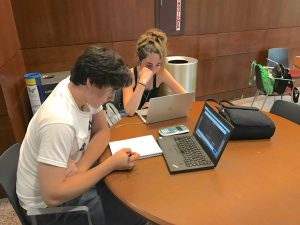By Joergen Ostensen

Chegg’s 2018 State of the Student report found that anxiety was a prevalent concern on college campuses. According to the report, 60 percent of students said they were at least frequently anxious.
The report, released Tuesday, collected data on which issues affect college students across the country by surveying 1,000 students from representative colleges and demographics.
According to the report, finances were a main factor in the anxiety, with 66 percent of students saying they cannot comfortably afford their housing and 68 percent at least frequently worried about their future.
The national rise in mass shootings has also been source of anxiety, as roughly two out of three students fear an incident of gun violence.
In addition to gun violence, national, political and social issues are also having an effect on college students. Half of the Hispanic students surveyed said they are concerned about someone they know being deported.
Also, according to the report, almost three quarters of Republican students and one quarter of Democratic students believe their country in moving in the right direction.
Dan Rosensweig, president and CEO of Chegg, said that the anxiety reflects issues found in the adult world and are not unique to this study, but the large numbers of stressed students may be due to increased reliance on technology.
“[The report’s findings] may not seem particularly new,” he said. “But today’s complex economic, political, social and tech-dominated landscape has accentuated the tension and burden students feel.”
Jeffrey Ng, the director of Fordham’s Counseling and Psychological Services (CPS), said the statistics relating to anxiety are consistent with the data available to CPS.
“Anxiety is the most common presenting issue/problem in our office, and nationally,” he said.
Ng also cited the 2017 National College Health Assessment, which he said found that 62 percent of college students reported feeling overwhelming anxiety within the past 12 months.
According to the report, loneliness disproportionately affects LGBTQ students, 61 percent of whom reported feeling very lonely, while only 41 percent of all surveyed students said the same.
According to CPS data, 23 percent of Fordham students had felt isolated and alone two weeks before being surveyed.
The report also found that 63 percent of students were unaware of or did not seek out their college’s mental health services.
Ng said that 1,700 students utilized CPS on all three of Fordham’s campuses during the 2017-2018 school year.
Ng said that CPS provides short term individual and group counseling, crisis interventions, psychological and psychiatric evaluations, psychiatric medication management and referral services. From a prevention and psycho-education perspective, CPS provides consultations, programming and trainings for the community. He encouraged anyone interested in learning more to visit the organization’s website.
Chegg’s press release announcing the report described it as a comprehensive look at what college students are experiencing.
“The report provides a sweeping view of what today’s college students are experiencing in their daily lives, covering such areas as financial issues, anxiety and mental health, campus safety, inclusivity and discrimination, political divisiveness and their outlook on the future,” said the press release.







































































































































































































